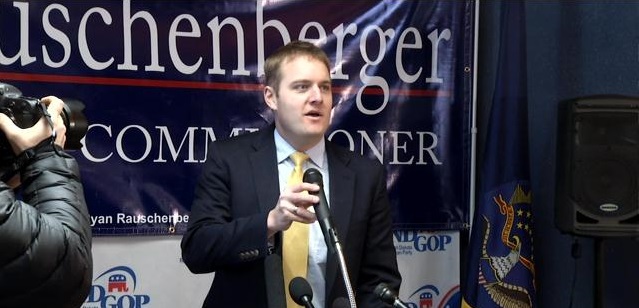Rauschenberger: Seeking Treatment Was "One Of The Best Decisions I Ever Made"

I spoke with him this morning while guest hosting for Mike Kapel on WDAY AM970 for the first time since I broke the news about his alcohol issues. I asked him about how he felt after his treatment and winning his first statewide election, and not surprisingly he said he felt good.
Treatment was “one of the best decisions I ever made,” he said. Which has a gratifying ring to it. As I noted during the segment (the full audio is above), we often harbor very cynical attitudes about politicians, and deservedly so. We tend to forget that they are also human beings. I’m glad North Dakota voters were willing to look past Rauschenberger’s personal struggles and vote on his performance in office.
I also spoke to Rauschenberger about tax policy. One major concern many in the state have is the impact dropping oil prices might have on revenues. After all the state budget has grown significantly in the last several bienniums – by more than 62 percent in the current biennium alone – and Rauschenberger acknowledged that it’s something we should be concerned about.
[mks_pullquote align=”right” width=”300″ size=”24″ bg_color=”#000000″ txt_color=”#ffffff”]”Every dollar [in lower oil prices] is about $100 million of just oil taxes off the table based on production, holding that constant,” he said. “So if you take $10 off the price of oil that’s a billion dollars.”[/mks_pullquote]
“Every dollar [in lower oil prices] is about $100 million of just oil taxes off the table based on production, holding that constant,” he said. “So if you take $10 off the price of oil that’s a billion dollars.” I had made the point that the impact of lower oil prices wouldn’t just be on the oil tax. Lower prices means less production activity which means less commerce which, in turn, means less sales tax revenues, income tax revenues.
Rauschenberger agreed, noting that his analysis was just a static one looking at the oil price.
Obviously, that’s a little scary, though tempering concerns is that most oil tax revenues go directly into constitutional and statutory funds. By law, only $300 million of direct oil tax revenues are deposited into the general fund. Still, lower oil prices could mean a big hit for the state.
I also asked Rauschenberger about the outlook for tax reforms in the legislature. He said the focus was more likely to be on the income tax – reducing it or eliminating it – than the property tax this session.
I also asked, since the state is so dependent on oil production for revenues these days, about the possibility of reforming the oil tax. Democrats have sought to make even discussing that policy a sort of third rail – see here and here – but I think it’s worth discussing. Rauschenberger didn’t take a side one way or another, but he did explain that if oil prices were to get down under $52/barrel for at least five months the effective oil tax rate – currently about 11 percent – would be cut roughly in half.
That, on top of reduced production, would be a terrible blow for the state.
I don’t think it’s an unreasonable ask to set the oil tax at a flat rate, with no exceptions, at a lower percentage.




